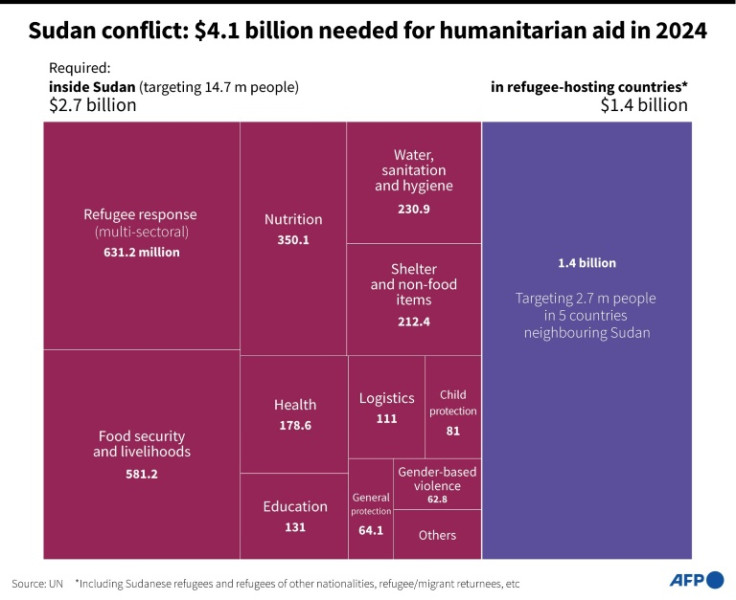
Sudan's warring sides have agreed to meet for talks on enabling desperately needed aid delivery in their conflict-torn country, the United Nations said on Wednesday.
The UN also appealed for $4.1 billion to help civilians impacted by the brutal 10-month civil war in Sudan, warning the conflict had fuelled "epic suffering".
The brutal conflict that erupted in April last year between Sudan's army chief Abdel Fattah al-Burhan and his former deputy, Mohamed Hamdan Daglo, commander of the paramilitary Rapid Support Forces (RSF) has killed thousands, including between 10,000 and 15,000 in a single city in the western Darfur region, according to UN experts.
It has sparked a humanitarian collapse, leaving over half of the country's population -- around 25 million people -- in need of assistance and protection.
UN aid chief Martin Griffiths told reporters in Geneva that he had recently been in contact with the two warring generals about convening "empowered representatives of the two militaries" to discuss aid access.
He said he wanted "to get them to follow up the commitments of the so-called Jeddah Declaration", which the two sides signed last May, agreeing to spare civilians and civilian infrastructure and to let in badly needed aid.
"The lack of access for us is very, very considerable," he warned.
Griffiths said he had received "positive responses from both sides", but said he was "still waiting for a confirmation on when and where".
Switzerland had been mentioned as a possible venue, he said, adding that both sides had suggested they were prepared to come to the wealthy Alpine nation.
He said he hoped the meeting could take place "face-to-face", but said plans were underway to organise a virtual call next week "as a first step".
While the Jeddah conference was organised by Saudi Arabia and the United States, Griffiths said "this time it's the UN that will be the mediator".
Griffiths stressed the urgency of improving aid access, pointing out that half of those in need of assistance were children.
"It is extraordinarily grave."
The expanding fighting in Sudan has sparked rampant hunger with nearly 18 million people facing acute food insecurity.
And the intense hostilities have damaged water supply networks and other critical civilian infrastructure, and left nearly three quarters of health facilities in conflict-affected states out of service, the UN said.
At the same time, diseases like cholera, measles and malaria are spreading fast.
This coupled with soaring malnutrition rates has created a situation where at least one child dies every two hours in the sprawling Zamzam camp for displaced people in the western Darfur region, the Doctors Without Borders charity warned this week.
Amid widespread reports of gender-based violence, the war has also created one of the world's largest protection and displacement crises.
Nearly eight million people have fled their homes, including more than 1.5 million who have crossed into neighbouring countries, according to UN figures.
The UN and its partners said they needed $2.7 billion this year to reach 14.7 million people with desperately-needed aid inside the country.
Griffiths lamented that a similar appeal last year was less than half funded, stressing "we must do better and with a heightened sense of urgency".
The UN refugee agency UNHCR meanwhile said it needs another $1.4 billion to help nearly 2.7 million people -- refugees and members of their host communities -- across five of Sudan's neighbouring countries.
"The neighbouring countries are all very fragile," UN refugee chief Filippo Grandi told reporters.
He highlighted deep concerns around regional stability, and cautioned that without more funding, far more Sudanese refugees would attempt dangerous journeys towards Europe.
"I have warned ... European countries in particular that if the current neglect of this crisis continues, we will see (significant) secondary movements," he said.







